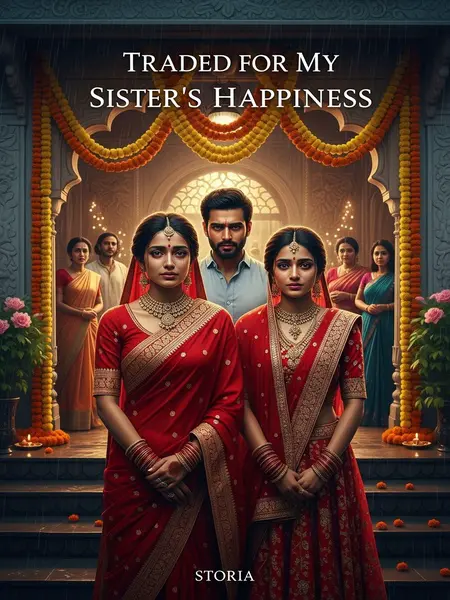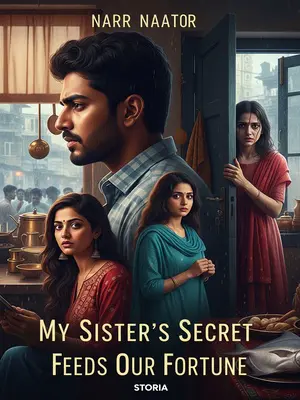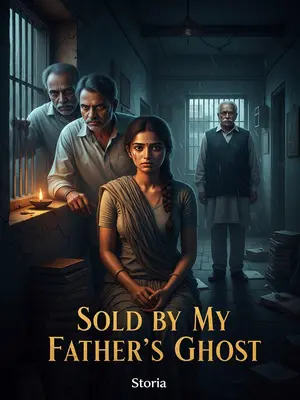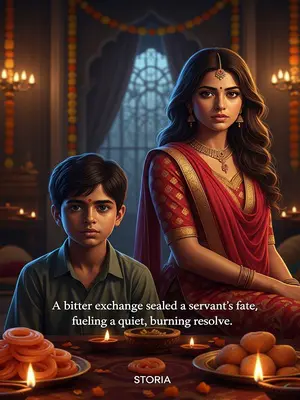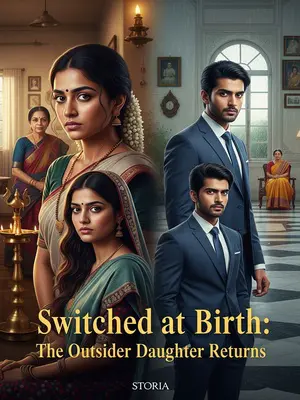Chapter 3: Wedding Bargains and New Beginnings
The scent of fresh gulab jamun mixed with the musty coolness of the old bungalow, while the distant azaan floated in through the open window. Shanti didi, faithful as ever, came running barefoot, breathless with worry. She threw her faded green shawl over my shoulders, shielding me from curious eyes. "Arey baba, chalo bitiya, jaldi ghar chalo," she murmured, wrapping me in her warmth and love.
When I returned to the bungalow, I learnt that Kabir had personally escorted my younger sister home and was now accompanying the doctor as she was examined.
The drawing room buzzed with nervous chatter. Servants tiptoed around, carrying trays of ginger tea and paracetamol. I heard snippets: "Arrey, Kabir beta toh bilkul hero hai," and "Ananya bitiya ko toh kuch nahin hua na?" My presence went largely unnoticed, as if I were a ghost passing through my own home.
I waited until nightfall before I finally saw him arrive, late.
The clock ticked past midnight. The night air was thick with the scent of jasmine and the distant sounds of a train. Kabir entered, his steps heavy, his face pinched with exhaustion—or perhaps guilt.
As soon as he saw me, Kabir didn’t offer a single word of comfort. Instead, he scolded me without restraint.
He didn't bother to lower his voice. Even the servants paused, pretending to dust as they strained to hear every word.
Kabir’s eyes were full of disappointment and anger. He looked at me as if I were a stranger—someone to be judged, not loved. The warmth I remembered from childhood had turned to frost. As he accused me, I tried to hold back tears, fiddling with the edge of my dupatta and glancing away at the family portrait, desperate not to let him see my pain.
The accusation landed with the force of a slap. My knuckles whitened around the shawl. The urge to defend myself warred with the knowledge that nothing I said would matter. Even though I had already given up hope in him, his words still sent a chill through my heart.
We had grown up together, playing as soon as we could walk, our marriage arranged since childhood. I remembered chasing kites across the rooftop, sharing stolen mangoes and secrets. Once, we had dreamed of a life together—simple, happy. But the world had changed, and so had he.
Even if he no longer liked me as his fiancée, for the sake of more than ten years of affection, he shouldn’t be so heartless.
He stood before me now, not as a friend or a lover, but as a judge handing down a verdict.
Time and again, he sided with Ananya and argued with me, making me look bad in public. Even when the truth was on my side, his loyalty always lay elsewhere. Each time, I was left to nurse my wounds alone, while Ananya gathered sympathy like flowers in her lap.
No matter what I did—speak my mind, laugh too loudly, challenge tradition—he found fault. But Ananya’s silence was always virtue; her tears always justified.
Especially after a year ago, when Ananya supposedly saved him once, he protected her even more fiercely—truly holding her at the centre of his heart.
Now, rumours filled Lucknow that he was dissatisfied with me, his childhood fiancée. Gossips in the bazaar—fruit vendors, drivers, even the barber—had opinions. "Kabir babu ka mann toh kahin aur hai," they would say. "Izzat toh Priya bitiya ki gayi."
Neighbours and relatives whispered behind my back, painting me as jealous, spiteful, the obstacle in their filmi love story. Even the old chowkidar eyed me with pity.
I forced the words out, my voice flat, eyes fixed on the floor. It was the truth, but it sounded hollow, as if even I had stopped believing it would matter. Suppressing my anger, I looked at him coldly.
He actually laughed—short and sharp. I felt the sting of it more than any insult.
His voice dripped with certainty. In his eyes, my word meant nothing. I realised then that I could not reach him, no matter what I said.
It was not a request, but a command. My pride rebelled, but the weight of his expectation pressed down hard.
His words felt like a sentence, a vision of the future I wanted no part of. The image of a silent, obedient wife—Ananya’s ghost living in my skin—chilled me more than the lake ever could.
Even as I spoke, I knew there would be consequences. But I no longer cared. Some battles, you fight for your own soul.
He turned on his heel, the echo of his footsteps as final as a slammed door. I listened to the sound fade, breathing in the silence he left behind.
The whispers about Ananya’s mother’s past never truly faded, even after years under our roof. Baba tolerated her presence, but only because tradition demanded it. I could see the lines of resentment etched into his brow whenever her name was mentioned at the dinner table.
Her eyes would fill with tears at the slightest provocation, and she’d sigh dramatically, “Main toh bas ek naukrani hi thi, bhagwan jaane meri kismet mein kya likha tha.” Even the cook would shake her head, whispering, "Drama queen hai."
No matter how innocent my words, if he entered the room, it would always look as though I was the villain. "Ananya, tu theek toh hai?" he would ask, shooting me a look of barely disguised contempt.
Sometimes, I wondered if he was truly blind or simply chose to believe what suited him. Maa would say, “Ladkon ko toh kuch samajh hi nahin aata jab dil aa jaye.”
Even small misunderstandings would escalate. The servants knew to clear out when Kabir and I were in the same room. His voice would rise, always in her defence.
……
The words escaped before I could stop them, sharp as a slap. The world seemed to tilt on its axis, as if I’d just broken a sacred rule.
Maa dropped her shopping bag, the sound of potatoes thudding against the floor echoing in the quiet house. She turned to me, eyes wide in disbelief.
Her brows drew together, lips thinning in that familiar way that meant trouble. She pulled me into the kitchen, away from the ears of the staff, her voice a fierce whisper.
She cupped my face in her hands, callused fingers gentle. Her eyes flashed with a rare fury. “Woh aurat toh shuru se hi issi chaal mein thi. You must stay strong, beta.”
She pressed a warm hand to my cheek, offering a silent promise that I would not face this alone. In her gaze, I found the strength I’d lost.
She leaned in, her voice conspiratorial. "Main teri taraf hoon, samjhi? Bas, ek baar shaadi ho jaaye, sab theek ho jayega."
My resolve surprised even me. The room felt lighter, the air less oppressive, as I spoke the words aloud.
It was a simple logic, free of bitterness or drama. If their happiness lay together, why force a lie?
My mother stared at me, speechless. But in her eyes, I saw a glimmer of respect—a recognition that I was no longer the child she needed to protect, but a woman who could choose her own fate.
By sunset, a peon arrived with a note. The excitement in the air was palpable. Even the household help seemed to sense something big was afoot.
She skipped through the corridors, the silver bells on her anklets jingling with every step. Her laughter echoed through the house, light and triumphant.
She burst into my room without knocking, her eyes wide with barely concealed glee, her dupatta perfectly draped. Her voice was soft, but the edge was unmistakable.
Her words dripped with sweetness, but I caught the note of pride beneath. She placed the medicine packets on my bedside table, arranging them so the label faced me.
She bit her lower lip, eyes lowered, as if she were on the verge of tears. The effect was calculated to perfection.
I pushed the packets aside, my voice clipped, refusing to give her the reaction she sought.
My words were final. There would be no bargaining, no pleading. The deal was struck.
He kept his distance, but ensured she wanted for nothing. Even so, he rarely included her in family matters, and the subtle slights did not go unnoticed by the servants.
The alliance was respectable, even desirable, especially for a girl of Ananya’s status. The family’s pride would remain intact, and tongues would have little reason to wag.
Maa once said, "Arjun Singh jaise ladke toh aajkal milte nahi. Bahut shareef hai, bahut zimmedar."
People in the mohalla often whispered that Ananya was lucky—few girls from such a background secured such a rishta. But for Ananya, it seemed, nothing was ever enough.
The servants had long noticed the glances, the laughter, the way Kabir’s gifts always seemed to find their way to Ananya. Even my youngest cousin smirked, "Bhai Kabir ko toh sirf Ananya didi dikhayi deti hai."
The mask slipped. Her eyes flashed with triumph, her lips curving into a smirk. I felt the urge to slap her, but held myself back, pride keeping me rooted in place.
Her words sliced through me, cold and sharp. But instead of crying, I met her gaze, my own pride rising to the surface.
I dug my nails into my palm, forcing myself to breathe. I refused to let her see my pain.
Her eyes widened, mouth trembling. “Didi, you’re still not well, so I won’t disturb you. I’ll come see you another day.”
She gave a quick, mock bow, then floated out, leaving behind the faint scent of rosewater and triumph.
The secret hung in the air like humidity before a monsoon downpour—thick, heavy, waiting to break.
Relatives poured in from every corner of the country. The kitchen was a riot of activity: samosas frying, laddoos being rolled, the pressure cooker whistling from dawn till dusk. The compound was festooned with orange marigolds and green mango leaves, and the air hummed with excitement.
His absence added a note of tension—would he approve? Would he notice the switch? Only time would tell.
The sound of dhols and conch shells filled the air as Kabir’s party entered the compound. Neighbours craned their necks over the walls, eager to glimpse the spectacle. The servants scrambled to lay out welcome trays, and children ran about, eyes shining.
He cleared his throat, adjusting his shawl. The crowd fell silent, eager for an announcement.
A collective gasp ran through the assembly. Aunties clutched their pearls, uncles exchanged surprised glances. The news spread like wildfire: "Arrey, Ananya ko 108 loads mile hain!"
His words dripped with concern. Ananya blushed, playing with the end of her dupatta. I watched, feeling invisible.
The statement hung in the air, bold and unmistakable. Aunties began whispering, "Kabir beta toh bilkul bhai hai Ananya ka. Kya zamana aa gaya hai!"
She protested, but her eyes sparkled. For her, every gesture was theatre, every word calculated.
Her voice was soft, full of false humility. I bit my tongue, refusing to rise to the bait.
Boxes of all shapes and sizes—trunks inlaid with brass, velvet-wrapped parcels, gleaming silver utensils. Even the gatekeeper gawked, whispering, "Itna saamaan toh raja-maharajaon ke ghar jaata hai."
The number, so auspicious in our tradition, stung all the more for its symbolism. For Ananya, nothing but the best.
If anyone had looked closely, they might have seen the bitterness in my eyes, the way my lips curled at the corners. "Kya kismet hai," I thought sarcastically.
Even the family priest raised an eyebrow. "Aisa kabhi nahi dekha," he muttered to Papa, who looked more and more uneasy.
His voice was sharp, heavy with years of authority. The assembled relatives fell silent, sensing a scandal in the making.
He spoke with the righteousness of a man convinced of his own generosity, blind to the wounds he inflicted.
His tone was patronising, as if my feelings were too trivial to bother with.
The final blow. He expected me to mother her, to set aside my own wounds for the sake of his peace of mind.
My hands trembled as I forced myself to breathe deeply. Maa’s words echoed in my head: "Kabhi kisi ke liye apni izzat mat khona, Priya."
I watched his face, searching for even a flicker of honesty, a sign that he understood how much he’d hurt me.
Her smile faltered, hands twisting in her lap. For once, she seemed truly afraid that her game might be up.
Kabir was clearly stunned, then frowned tightly. “This marriage was arranged since childhood. The whole city knows. With only a month left, how could we call it off?”
His pride would not allow such a public humiliation. For him, appearances mattered more than truth.
He offered a crumb of kindness, but it was too little, too late.
He smiled, as if that solved everything. I looked away, unwilling to meet his gaze.
Her cheeks glowed, her lashes fluttering. The effect was lost on no one—least of all on the crowd, who murmured approvingly.
A victorious gleam flashed in her eyes, gone in a blink. My lips tightened, but I held my silence.
A strange peace settled over me. For once, I was free of doubt, sure of what needed to be done.
There was no point in arguing. Kabir would never listen, never understand. I would have to act, not speak.
His ego would not allow him to believe that I could choose to leave him, that I might walk away first.
He would make excuses, cajole, blame me for being emotional—anything but admit the truth.
Better to act in silence than be dragged into another humiliating scene.
In my heart, I offered a silent prayer to Ganpati Bappa—"Let this be the last time I must choose between duty and dignity."
Each day was a blur of rituals—mehendi on my hands, the pungent scent of turmeric during the haldi ceremony, the weight of gold jewellery pressing into my collarbones. Laughter and songs filled the house, but I moved through it all like a ghost, waiting for the day to arrive.
He brought gifts—silk sarees from Benaras, sweets from Ram Asrey. But the gifts were always for both sisters, never just for me. He lingered in the corridors, searching my face for forgiveness, but I offered him only politeness.
Headaches, mehendi appointments, a sudden need to visit the temple—any excuse would do. I built a wall of distance, brick by careful brick.
She wore the brightest colours, her hair perfectly oiled and braided, her laughter ringing out like temple bells. They sat in the courtyard, lost in conversation, as if rehearsing for a future I had willingly surrendered.
The thought no longer hurt. Instead, I found a strange comfort in imagining their lives together—two actors in a play of their own making.
The envelope was rough, dust-stained, bearing the insignia of the army. My hands trembled as I broke the seal, the world outside fading to a hush.
My words had been blunt, honest. I had no right to upend his life without warning. I asked only for his understanding—and, if possible, his consent.
The thought of a lifetime spent with a stranger, forced into misery by circumstance, was a fate I wouldn’t wish on anyone—not even myself.
The paper was creased, the ink bold and steady. I held my breath as I read.
There was only one word on the paper, written in a bold, flowing hand.
Yes.
I pressed the letter to my chest, and for the first time, the monsoon clouds outside seemed to part—maybe, just maybe, my story would begin anew.
